I write science fiction and poetry. Less Shakespeare references than you'd probably expect. Main Tumblr / Twitter / Ko-Fi
Don't wanna be here? Send us removal request.
Text
I just rediscovered Cold Turkey Writer and it's changing my damn life. I've been using his internet blocker (Cold Turkey Blocker) for years, but somehow forgot that he has a distraction-free writing program, too. There's a free version, but I bought the Pro version for the extra features because it's only $9. (That's the one-time payment to own it forever, y'all - part of what makes this dude's stuff so cool is that he doesn't use the subscription model.) Also I just realized this sounds like an affiliate ad or something - it's not. I honestly just really love his software and think everyone should try it. Go get it for free and stop procrastinating!
2K notes
·
View notes
Text
some people think writers are so eloquent and good with words, but the reality is that we can sit there with our fingers on the keyboard going, “what’s the word for non-sunlight lighting? Like, fake lighting?” and for ten minutes, all our brain will supply is “unofficial”, and we know that’s not the right word, but it’s the only word we can come up with…until finally it’s like our face got smashed into a brick wall and we remember the word we want is “artificial”.
253K notes
·
View notes
Text
STOP USING GRAMMARLY! THEY MAKE YOU PAY FOR THE BEST FEATURES! KNOWLEDGE SHOULD BE FREE!
use Scribens! it's all free unless you want consultations! and they actually have good suggestions!
SCRIBENS HERE
1K notes
·
View notes
Text
WEBSITES FOR WRITERS {masterpost}
E.A. Deverell - FREE worksheets (characters, world building, narrator, etc.) and paid courses;
Hiveword - Helps to research any topic to write about (has other resources, too);
BetaBooks - Share your draft with your beta reader (can be more than one), and see where they stopped reading, their comments, etc.;
Charlotte Dillon - Research links;
Writing realistic injuries - The title is pretty self-explanatory: while writing about an injury, take a look at this useful website;
One Stop for Writers - You guys... this website has literally everything we need: a) Description thesaurus collection, b) Character builder, c) Story maps, d) Scene maps & timelines, e) World building surveys, f) Worksheets, f) Tutorials, and much more! Although it has a paid plan ($90/year | $50/6 months | $9/month), you can still get a 2-week FREE trial;
One Stop for Writers Roadmap - It has many tips for you, divided into three different topics: a) How to plan a story, b) How to write a story, c) How to revise a story. The best thing about this? It's FREE!
Story Structure Database - The Story Structure Database is an archive of books and movies, recording all their major plot points;
National Centre for Writing - FREE worksheets and writing courses. Has also paid courses;
Penguin Random House - Has some writing contests and great opportunities;
Crime Reads - Get inspired before writing a crime scene;
The Creative Academy for Writers - "Writers helping writers along every step of the path to publication." It's FREE and has ZOOM writing rooms;
Reedsy - "A trusted place to learn how to successfully publish your book" It has many tips, and tools (generators), contests, prompts lists, etc. FREE;
QueryTracker - Find agents for your books (personally, I've never used this before, but I thought I should feature it here);
Pacemaker - Track your goals (example: Write 50K words - then, everytime you write, you track the number of the words, and it will make a graphic for you with your progress). It's FREE but has a paid plan;
Save the Cat! - The blog of the most known storytelling method. You can find posts, sheets, a software (student discount - 70%), and other things;
I hope this is helpful for you!
(Also, check my blog if you want to!)
80K notes
·
View notes
Text
When you get the advice to “read more” to get better at writing, it’s not very concise and really sounds unhelpful after the third time you’ve heard it. So here, this is what you’re getting out of it (besides grammar or whatever):
You observe the way a story is organized and how it achieves its flow
You become familiar with tropes and archetypes
Story structure becomes an easy to recall memory, and every novel you’ve ever read becomes a reference book
You develop how you write stylistically, the things you hate and the things you try to emulate
You gain the skills to critique books in a smart manner, and therefore can recognize flaws in your own works that you remember bashing a novel for
11K notes
·
View notes
Text
The Actual Hiatus Announcement:
It’s been a while! My first semester at my new school is complete. I’ll be taking on a heavier course load during the summer in addition to the usual working full-time and other important responsibilities.
Super excited to be back in college, but I’ve got to manage my time accordingly.
As a result, official announcement of my upcoming absence. I know its not that big of a deal but I figure, I ought to be polite?
I’ll be taking time off from most social media in general for the next few months. Going to work on some blog consolidation and possibly creating my own website (again) for my writing.
I’ll have notifs for my twitter accounts on, so you can always hit me up there.
If you followed me for writing & bookishness (hajaja sorry) @e_caybenvolio
For the fandom (i.e. BnHA) and 3am rambling side of things: @nighteyeagency
Peace✌🏾
11 notes
·
View notes
Text
me: this scene is so boring i wish i could write this other scene i’m really excited about instead
brain: you can
me: explain how
brain:
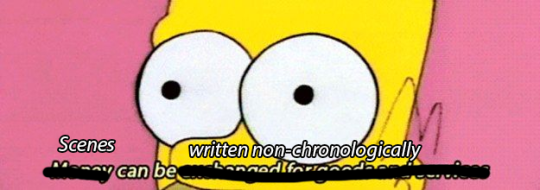
64K notes
·
View notes
Text
The hero shows up at the villain’s doorstep one night. They’re shivering, bleeding, scared. There’s also a slightly dazed look in their eyes– they were drugged. They look like they were assaulted. Looking up at the villain, swaying slightly as they’re close to passing out, they mumble “…didn’t know where else to go…” then collapse into the villain’s arms.
116K notes
·
View notes
Photo

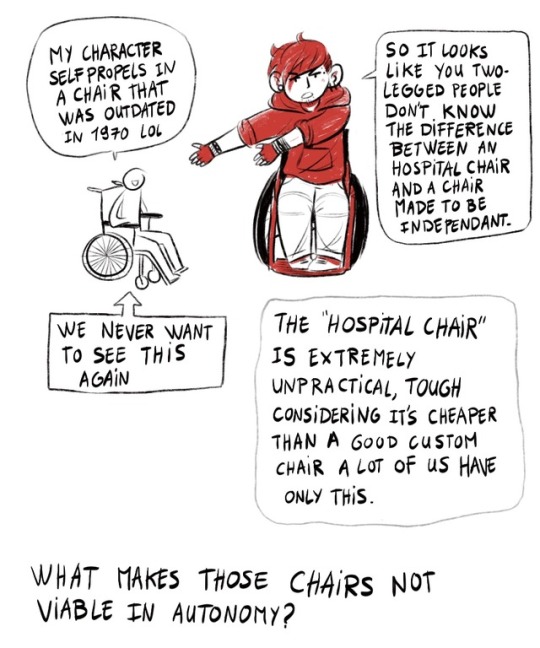
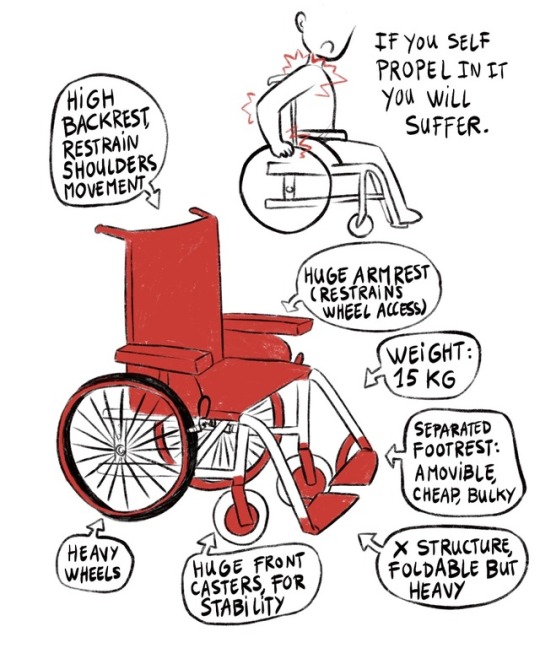

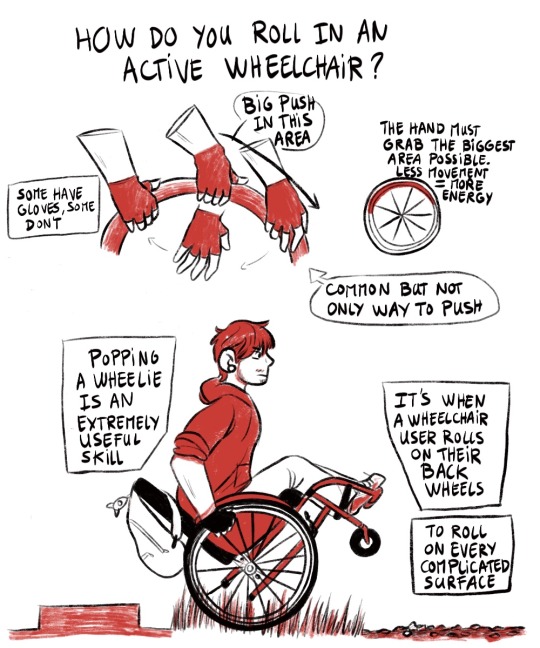
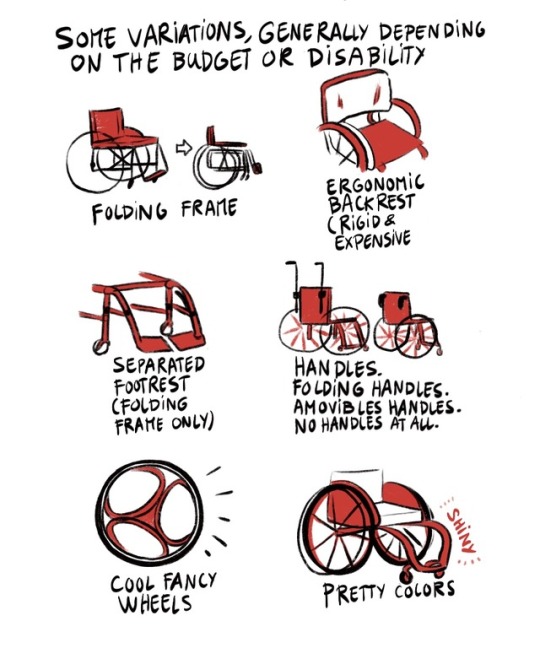
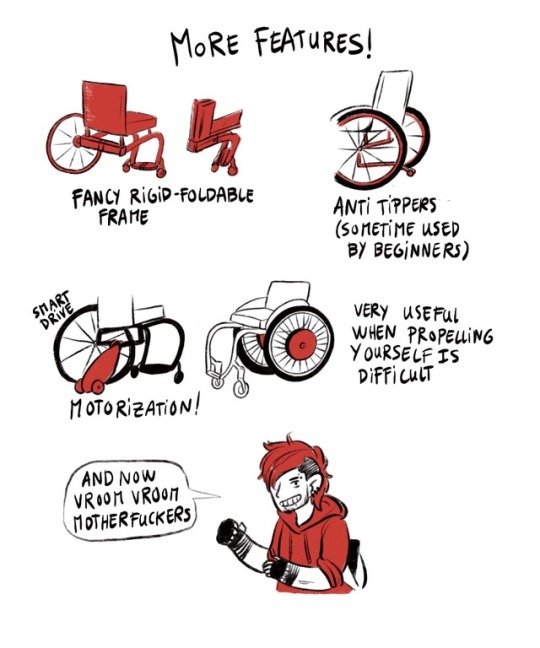
It’s here !! The guide for two-legged people who don’t know how to draw wheelchairs !!! 7 pages of infodump ! Disclaimer : I don’t know everything, I have one (1) experience of wheelchair user who used both bad and good chairs, and I share what I learned.
Image description :
1) Calvin in his wheelchair saying “yo” under a huge title “how to draw manual wheelchairs properly by Calvin Arium, a wheelchair user comic artist”.
2) A character says “my character self propels in a chair that was outdated in 1970 lol” Calvin says “so it looks like you two legged people don’t know the difference between an hospital chair and a chair made to be independant” an arrow point the crapppy chair, saying “we never want to see this again”
a bubble says “the hospital chair is extremely unpractical, tough considering it’s cheaper than a good custom chair a lot of us have only this”
3) a character hurt himself trying to reach the wheels of the hospital chair. Several arrows point why the chair is unpractical : “high backrest restrain shoulders movement” “huge armrest restrains wheel access” “separated footrest : amovible, cheap, bulky” “x structure, foldable but heavy” “huge front casters for stability” “heavy wheels”
4) Several arrows point an active wheelchair (the KSL by Küshall) : “usually no armrest” “a low backrest allow more movement” “light, design, ferning expersive” “special cushion to avoind injuries” “knee angle is usually 90°” “one single piece of frame, sometimes entirely welded” “weight : from 4 to 10kg” “often rigid” “center of the wheel is the center of gravity” “higher quality wheels : less spikes”
5) A hand grab different parts of the wheel, pushing harder in the second half. Bubbles says “some have gloves, some don’t. The hand must grab the biggest area possible. Less movement = more energy. This is a common but not only way to push.Calvin is on his back wheels, rolling on grass and dirt bubble says “popping a wheelie is when a wheelchair user rolls on their back wheels to roll on every complicated surface.
6) several drawings illustrate the folding frame, the ergonomic but rigid and expensive backrest, the separated footrest (only for folding frame), the handles, the folding handles, athe amovibles handles, or no handles, the cool fancy loopwheels, the pretty custom colors
7) More Features ! The fancy rigid-foldable frame, the anti tippers (sometimes used by beginners), the motorization (wheels, smart drive) when propelling yourself is difficult Calvin says “and now vroom vroom motherfuckers”
#say this on Twitter too!#im used to being around wheelchairs for folks that can't propel and the elderly#so this is a good ref#references
150K notes
·
View notes
Text

After a year of voiceless captivity, a bloodthirsty siren fights to return home while avoiding the lure of a suspiciously friendly and eccentric pirate captain.
[Read the full blurb here]
You may enjoy Our Bloody Pearl if you like…
merfolk
soft freckle-face boys
poetic sass
disability acceptance and emotional healing
crying
found family
warm feelings deep in your heart
all the diversity ™
that one beach episode of every anime ever
Stunning praise for Our Bloody Pearl:
“This book feels like getting a hug.” — Christina
“I hate the ocean but this made me want to go to the beach.” — Anonymous
“9.5 out of 10 crabs approve of this book.” — Crabby News Weekly
“Not nearly edible enough.” — Perle
Download for free until Midnight April 21st!
Even if you have the paperback or plan on buying it, by downloading the free ebook your click boosts the novel in the online ranks, helping more people find it! Please also consider reblogging this so others on tumblr can take advantage of the sale =)
* Warnings for drowning and the eating of exactly one (1) human liver.
2K notes
·
View notes
Text
People talk a lot about how reading is necessary for writing, but when you really want to improve your writing, it’s important to go beyond just simple reading. Here are some things to do when reading:
Note how they begin and end the story. There are a ton of rather contradictory pieces of advice about starting stories, so see how they do it in the stories you enjoy. Don’t only look at the most popular stories, but look at your more obscure favorites.
See what strikes you. Is it fast or complicated scenes with a lot of emotions? Is it stark lines? Pithy dialogue? What do you remember the next day?
Pay attention to different styles. It’s not just whether they use past or present tense, first or third person. It’s whether the writing is more neutral or deeper inside character’s heads. Do they use italics? Parentheses? Other interesting stylistic choices? Take the ones you like and try them out in your own writing. See what works and what doesn’t.
Keep track of how they deal with other characters. Do we see a lot of secondary character each for very brief periods of time or are there a couple that show up a lot? How much information do we get about secondary characters? Do they have their own plots or do their plots revolve entirely around the main characters?
Count how many plots there are. Is there just one main plot or are there multiple subplots? Are the storylines mostly plot-based or character-based?
Pay attention to what you don’t like. If you don’t like what’s going on in a book or even just a scene, note what it is. Does the dialogue feel awkward? Are the characters inconsistent? Does the plot feel too convenient or cobbled together? Does the wording just feel off? See if you can spot those issues in your own writing, especially when reading a completed draft or beginning a later draft.
26K notes
·
View notes
Text
Skills Writing Fanfiction Teaches You
I’m sick of seeing fanfiction treated like an inferior form of writing, so here are some valuable skills writing it can teach you.
Capturing a character’s essence. Nailing a character’s portrayal is tough to begin with, but accurately portraying someone else’s characters is even harder. Mastering someone else’s characters is a great way to learn how to keep your own characters consistent and shape their personalities believably.
How to write something you’ll enjoy and feel passionate about. What better way to start doing that than to write about characters you already know and have grown to care about. Thinking about the kinds of stories you’d tell with other people’s characters will help you figure out the types of characters and tropes that appeal to you.
Critically evaluating causal relationships. One simple change to canon can make a big difference. Exploring how changes to the plot affect characters is a great way to practice looking at the big picture and considering multiple paths for your plots to take.
Taking inspiration from existing settings. Having an existing setting ready to write about (if you choose to stick to a setting from canon) lessens the burden of world building and thereby encourages deeper thinking about the finer details instead of larger elements. Things the creator didn’t have the time or desire to address are yours to play around with. This will help you get a sense for things that feel like they fit well with the established setting. It will also encourage you to look to real world settings for inspiration too such as cities in other countries. Once you’re more comfortable exploring fictional settings, you’ll be more keen to dive into real ones too.
Letting your imagination run wild. You might initially think working with a set cast of characters and/or world might restrict your creativity, but, much like restrictions in original writing such as rules about what magic can’t do, these restrictions encourage creativity. The characters and/or setting may belong to someone else, but your take on them is your own.
How to handle criticism. Commenters can be very nitpick when it comes to franchises they love. As you receive feedback, you will learn what kinds of feedback are useful and which you can disregard. You’ll also learn how to deal with critics and network diplomatically. PR is important for published authors, so getting some practice with fanfiction commenters is a useful learning experience.
How to research. Double checking details about characters backstories or details about the setting isn’t that different from researching real world things.
Basically any other skill you can hone by writing original fiction. Practice makes perfect. The key to improving your writing is to write whether that means writing fanfiction or completely original works. Neither original fiction nor fanfiction is incapable of teaching you a wide range of things about topics you might not have cared about beforehand.
2K notes
·
View notes
Text
Getting more shit done in less time
So, my law classes for the year have just started. Life is hectic. But I still want to be a published author by the time I’m 25. Thus, here’s what I’m going to do to get more done in less time:
1. Go with your natural flow
5AM writers clubs and waking up an hour earlier to get some writing done is great. Very commendable. But it has never worked for me.
I can promise you that I won’t get any words written first thing in the morning. Because I am NOT a morning person.
Accepting this about myself, I try to use my naturally energetic times to my advantage. I get a random burst of energy at 8pm. So, that’s when I set out time to write.
Then in my dips, I do homework/household chores etc - things that need to get done but don’t need much inspiration/creativity.
Figure out when you’re at your best and use those times for the things that require the most mental energy.
2. Batch tasks
If you have a bunch of different things you need to get done, try to group similar tasks together.
If you’re already working on your computer for school/work, do all the things you have to do on it in succession.
This helps minimise the time you spend on practical things and the mental energy it takes to switch between different types of tasks.
This has really been a gamechanger for me, since I don’t continually have to switch gears between student, writer and blogger. I can be one thing at a time.
3. Schedule recharge time
This is very important. It might seem counterintuitive to slow down in order to be more productive, but it works.
Take an hour to relax after getting home from work/school. Allow yourself that time to recharge without feeling guilty.
This will recharge your mental and physical energy, and allow you to work more effectively when you start again.
The same applies to the hour/30 min before bed. Don’t work. Do some Bible study/read/journal/listen to a podcast. Something that will settle your brain and allow you to calm down. You will fall asleep much easier, sleep better and have more energy the next day.
4. Be organised
I am a naturally less-neat person. I get everything done, but my work area looks like a mess. Even if this applies to you as well, try to be as organised and neat as possible.
I have arranged my office in such a way that everything is easy to put away/put in the right place. I don’t have to go through much hassle to have an organised and neat work space.
This is useful, since you can’t get distracted when everything’s in order. You won’t have the urge to clean up when you sit down to do something else.
Plus, you save the time it would’ve taken you to find things.
5. Use every free minute you can
Yes, recharge and breaks are important, but if you have time to kill during which you would’ve just done nothing, use it.
I’m currently between classes, sitting on a random bench typing this post. Because I have to do it today and I have a free hour.
If you feel that you need that free time to chill and recharge, take the break. But if you’re just waiting, utilise the time on tasks you need to do anyway.
These are the things I’m implementing. Maybe they’ll work for you as well.
Reblog if you found these tips useful. Comment with your own tips. Follow me for similar content.
2K notes
·
View notes
Text
Subjects You Should Study if You Want to be a Better Writer
If you’re looking to be a writer, chances are you’re already pretty good in an English or Language Arts class. But aside from studying older literature to learn from, focusing exclusively on Language Arts materials is only going to get you so far. So, here are some subjects I’ve studied that I’ve found helpful to my writing.
Psychology: Since Psychology is the study of behavior, this is a good tool to study if you’re having problems with characterization. Understanding how people act and what thought processes cause people to take certain actions. This can help you give a character a more realistic response after experiencing emotional trauma, or may just help you slip into someone else’s mindset in order to write them better.
Cultural Anthropology: This may be more vital if you write Fantasy or Science Fiction, since both genres tend to require world building. Understanding the cultural element of society, what shapes it, and how it impacts behaviors, social norms, and etiquette can make worldbuilding easier for you.
History: If you write Fantasy, War Dramas, or Historical Fiction, the subject of history is going to be your best friend. Whether it’s pulling from real people, events, or conflicts, history is littered with a goldmine of possible story ideas.
Screenwriting/Playwriting: If you struggle with ‘show don’t tell’ or dialogue, this is probably going to be a useful skill to learn. Since films and plays tend to lack an internal narration, they’ll push you to have to learn how to convey information visually or through dialogue, taking away the crutch of narration. This can also be useful as a means of writing a skeleton version of your chapters with just basic setting and dialogue and then go in later and fill in the narration elements.
Linguistics/Phonology: If you want to create conlangs (constructed languages) for your story’s setting, then learning about the building blocks of language can be advantageous.
9K notes
·
View notes
Photo
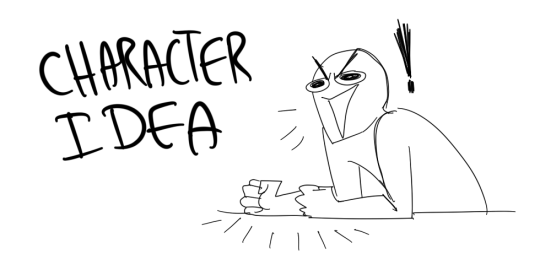
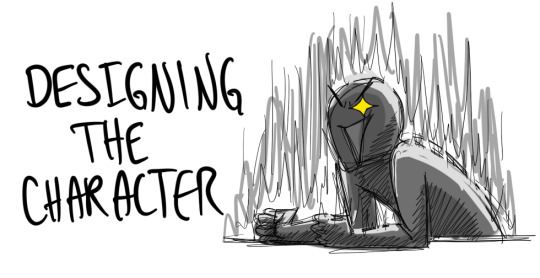


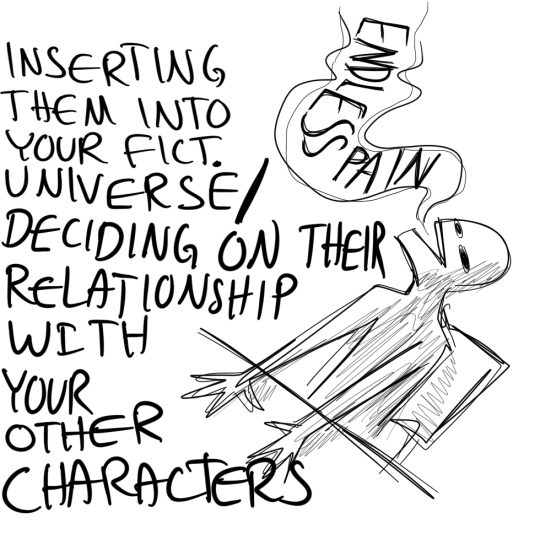
the suffering never ends
708K notes
·
View notes
Note
Adult literary fiction is known to often be quite ambiguous, right? To what extent can this be taken? How much does logic need to apply to a certain aspect of a story? For example, my main character thinks he's seeing the ghost of his neighbour but he can still interact with her. Does the reasoning for this have to be explained to the reader? Or can they just believe she is a ghost without a problem?
I’m kinda gonna go off on this because there are some really important things to consider here that I think many people struggle with.
#1 - RE clarity and ambiguity
Things that should be clear: the literal happenings of the plot. The who, what, where, when, and why (for the most part). If the reader needs to know this/understand this to understand what is happening and what the story concerns, it should not be ambiguous.
What can be ambiguous: the underlying layers of the story that speak to character nuances or plot nuances. Even without these things being clear, the reader still understands what is happening and why these things are happening. Sometimes there is purposeful ambiguity where the reader is very aware that this is meant to be ambiguous, but this has to be part of the intended takeaway (for example, an open ending).
#2 - RE logic and illogic
Logic depends on the rules of the world. If the world is set up to be a bit odd or illogical, that’s fine, as long as it’s part of the world’s tone. But if you’re in grounded realism, the world and people should work as they do in grounded realism. Things can be a bit ‘off’ but this feeling needs to be pervasive and consistent. The reality can be subtly surreal. For example, a friend of mine wrote a story in which there is a lake where over a dozen couples have committed pact suicides. This is obviously very extreme and not reality (the police would show up in a grounded reality version of the story), but the story continually supports the fact that the world is a slightly altered version of our own even if there is no literal magic or supernatural, it’s just a world where strange, slightly illogical things happen, creating a unique logic for the world. This wouldn’t work if the story were clearly rooted in realism.
#3 - RE the supernatural in litfic
You do not need to clearly lay out a system of magic or supernatural for the ghosts like you would in a fantasy book, but we should have an inkling of the nature of these visions and generally what is going on. So for example, it should be clear that he’s seeing her ghost because he has underlying guilt about her death (I dunno your book I’m making this up) and even if this isn’t stated on page, it should at least be very clearly implied, because we need to understand this to understand what is happening and why it’s important. What we don’t really need to know are things like how ghosts come to exist or work on a more technical manner (we might need to know some of this to the extent needed to understand the plot but it’s probably minor) but we don’t really need the large scale ‘ghost lore.’ It might be ambiguous whether the ghost is real or a hallucination, because we can still understand the plot without this knowledge, but it leaves the reader something to ponder.
I’m actually working on a book with a Literary Ghost™ and this is kind of a break down:
What we know: the main character can see ghosts, she’s been seeing ghosts since her mother died, ghosts don’t speak or interact with her, our narrator is a ghost, our narrator has an omniscient knowledge of our main character’s thoughts and feelings as well as those of the people around her
What we don’t know: if other people can see ghosts, why the main character can see ghosts, what causes some people to become ghosts, why the ghost is omniscient or how this is possible, technical details about the molecular physics of ghosts
What is purposefully ambiguous: whether the ghosts are real or hallucinations the main character sees as a manifestation of her grief
In a supernatural book you might need more of the stuff that’s not shared in this book, because you’d need a technical understanding of how ghosts work in order to deal with the plot, but in my book, ghosts are kind of just there as a feature of the main character’s world (which sounds like how your book is as well). We don’t really need the technical details because the plot is not about ghosts or the main character in conflict with ghosts. In my book, we understand the main character’s experience, but not really anything outside her experience.
#4 - RE magical realism vs fantasy
You’re kind of contemplating the difference between fantasy and magical realism here, which is a line many people struggle to distinguish. In fantasy, magic exists as a system which is separate from reality, but functions within reality. It is defined by clear limits and a knowledge that it is magical. In magical realism, magic exists as part of reality and is addressed and seen as reality. That’s why in fantasy we usually have lore, magic systems, and distinct ways these magical systems work within society or the world. In magical realism, we have flashes of magic that often function as a window or symbol for reality.
Let’s look at it this way. We have a concept: In our world, sometimes people turn into birds.
In fantasy: We have a world that is distinctly ‘other’ where it exists as an entirely different reality (high fantasy), or a society that exists within our own world but is distinctly other (low fantasy or urban fantasy). We understand that in this world sometimes people turn into birds. There is likely a name for people who succumb to this fate, rituals in the world involving this phenomenon, lore regarding why this happens (ex. religious beliefs), maybe famous examples of people who have turned into birds, maybe people live either in fear or in hope of this and this is a key point of conflict for the main character, and all in all there is a clear infrastructure to this occurrence.
In magical realism: One day the main character’s aunt turns into a bird and remains in their house, perched on the back of a chair, for the entire novel. We don’t know why she turned into a bird literally (because there isn’t really a why in this world, this stuff just happens), but we understand why she turned into bird symbolically. There’s no lore here, no larger structure. This is part of reality. It is illogical out of context, but in context, so logical the illogic of it doesn’t need explaining for the characters.
I have gotten a lot of questions from people who seem a bit confused as to what magical realism or surrealism is especially in contrast with fantasy genres, and I hope this explanation helps a bit!
174 notes
·
View notes
